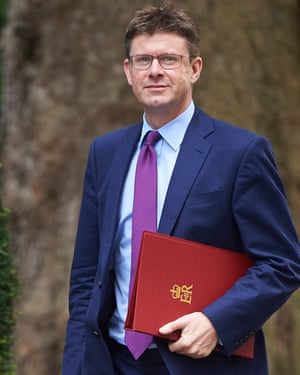
Renewables will be able to provide more of the UK’s energy when companies are able to store it more efficiently.
Photograph: Danny Lawson/PA
Household batteries will be key to UK’s new energy strategy
UK to pioneer energy innovation through batteries in homes as energy department announces £246m research funding
Batteries and renewable power sources are on the verge of bringing about an “epochal transformation” of the UK that could make energy clean, abundant and very cheap, according to a cabinet minister.
As the government unveiled plans for a more flexible energy system and £246m of funding for battery research, Greg Clark told the Guardian that a smarter grid would “radically” bring down bills.
“Energy, for the last 100 years, for good reasons, we’ve rationed the consumption of [because] it’s been very expensive and environmentally-damaging to consume fossil fuels. [But] given the possibilities we are on the cusp of at the moment, we might move to a world where energy is clean and abundant,” said the business secretary.
Storing intermittent renewable power in batteries so it was ready when the grid needed it would bring down costs for everyone, including vulnerable and low income energy consumers, he said.
“If only we can capture it [power from the sun and wind] then we can go from energy being a worrying cost to people, to being, if not free, then very cheap,” Clark said, speaking in Birmingham on Monday as he put energy at the centre of the government’s industrial strategy.

Renewables have grown from almost nothing a decade ago to supplying more than a quarter of the UK’s power today, and are expected to increase their share further as costs fall and reach subsidy-free levels.
But the variable nature of wind and solar power generation means that local energy networks and the National Grid need more flexibility to cope with those fluctuations.
Batteries, and the ability for energy firms to automatically reduce electricity demand from willing businesses and households, are at the heart of a plan published by government and Ofgem.
Ofgem said using technology to flatten out peak demand and avoiding the cost for reinforcements to energy networks would save consumers £17bn-£40bn by 2050. The regulator said that the 29 changes to energy regulation announced on Monday, which will come in over the next 18 months, would also encourage new, tech-savvy entrants into the energy market.
Andrew Burgess, an associate partner at Ofgem, pointed to emerging smart appliances that could automatically turn down electricity use at peak times, and make it possible for companies to aggregate the solar power from householders’ rooftops and sell it to local power grids when needed.
The changes should also make it easier for companies to aggregate and trade services from people who have fitted solar panels or batteries at home – selling households’ electricity to power grids at times of need.
“For individual consumers, I think the opportunities are for businesses coming in, for the Amazons and Netflixes of the world coming into a traditional sector and offering different ways for consumers to engage,” Burgess said.
The smart grid plans came as ministers launched the Faraday Challenge, pledging £246m of funding for battery research, £45m of which will be used to create a national battery institute,which will be a virtual grouping of universities across the UK.
“Its work will quite literally power the automotive and energy revolution, where the UK is already leading the world,” said Clark.
He added that the national battery centre would be a fitting way to mark the 150th anniversary of the death of Michael Faraday, the scientist who undertook groundbreaking work on electricity.
The energy industry, carmarkers and green groups welcomed the push on smart grids and batteries. Phil Sheppard, National Grid’s head of network strategy, which already runs schemes where businesses are paid to turn down electricity consumption when demand peaks, said: “Today’s report provides clear direction on how we move to a secure, low carbon, flexible energy system, using efficiency and innovation to help keep costs down for bill payers.”
WWF said the moves would accelerate the rollout of renewables and electric cars. Gareth Redmond-King, the group’s head of energy, said: “Battery storage is a clear game-changer in our ability to produce clean power from renewables.”
Nissan, which makes the batteries for its leaf electric car in Sunderland, said the government plans, combined with having more cars plugged into the grid, would have “a fundamental impact on the shift from fossil fuels to renewables”.
But some industry watchers said that while the changes were necessary, they risked creating a two-tier energy system of haves and have-nots, if adequate protections were not put in place.
Jon Ferris of Utilitywise said: “Today’s announcements will be transformational for the energy sector, but are not a panacea for the challenges of maximising energy productivity and accommodating increasing renewable generation.
“Some domestic consumers may save money, but there is a risk that only consumers able to afford new appliances, solar photovoltaics and storage will benefit.”
However, Clark was adamant that the plans would reduce rather than increase inequality in the energy market.
“[There] should not be a class of people who are excluded from these possibilities on the way to a big, abundant future,” he said, adding he would make it clear to energy suppliers that they had an obligation to help vulnerable customers access new technology.










